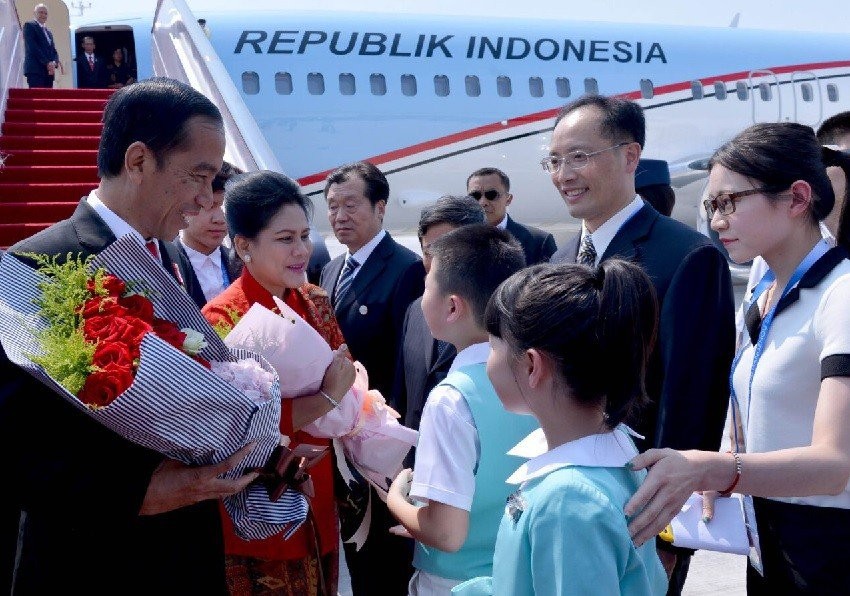Popular Reads
Top Results
Can't find what you're looking for?
View all search resultsPopular Reads
Top Results
Can't find what you're looking for?
View all search resultsExpectations of Indonesia’s renewed role in G20
Change text size
Gift Premium Articles
to Anyone
 President Joko "Jokowi" Widodo and First Lady Iriana Joko Widodo receive bouquets of flowers as they arrived in Hangzhou Xiaoshan International Airport on Sept. 2. Jokowi is visiting China for bilateral meetings and attending the G20 summit on Sept. (Photo courtesy of Cabinet Secretary/Laily Rachev)
President Joko "Jokowi" Widodo and First Lady Iriana Joko Widodo receive bouquets of flowers as they arrived in Hangzhou Xiaoshan International Airport on Sept. 2. Jokowi is visiting China for bilateral meetings and attending the G20 summit on Sept. (Photo courtesy of Cabinet Secretary/Laily Rachev)

President Joko “Jokowi” Widodo recently attended the G20 Summit in Hangzhou, China, joining leaders of the world’s advanced and emerging economies in discussing pressing issues related to the global economy. Jokowi’s presence underlined Indonesia’s active role in the multilateral forum since its inception in 1999, despite questions over its benefits and importance for the people.
After 17 years, Indonesia’s participation in the G20 seems to remain unfamiliar to many. Only a small proportion of the Indonesian population is aware of what happened at the recent meeting. Worse still, national media gives only limited accounts of G20 meetings and agendas, including the last summit in Hangzhou, which concluded on Monday.
It is the government’s responsibility to explain more to the public at large about Indonesia’s involvement and policies in the G20, so that the relevance of its G20 membership can be understood.
The strategic value of the G20 is commonly recognized. As a multilateral forum, it helped the world economy recover from the Asian crisis of 1997–1998. Its members, which account for more than 85 percent of the world’s economy, play a strategic role. If the economies of its 20 member states are healthy, we can assume that the world’s economy will also be sound.
Thus, the G20 is too important to be neglected. Indonesian membership in an international forum with so much prestige certainly provides a golden opportunity to advance national interests. However, Indonesia also fully understands that its membership in the G20 entails a unique position and responsibility.
As one of the representatives of developing countries, hopes abound for Indonesia to push the issues of global inequality and poverty at the G20 forum. So far, however, Indonesia has been unable to fulfill the dual purposes. As an emerging and middle-power country, Indonesia has limitations in maximizing its presence at the multilateral forum.
Despite enjoying relatively good economic growth lately, Indonesia’s position is very different compared to big economies such as the US and China. Among the member countries of the G20, Indonesia is still trapped by huge debt with a small foreign exchange reserve. As of the end of July 2016, Indonesia’s national Forex reserve stood at US$111.4 billion, against China’s $3.2 trillion.
Despite the limitations, Indonesia can play a major role at the G20. At previous summits, Indonesia proposed various initiatives such as the General Expenditure Support Fund and cochaired working groups to reform international financial institutions (2008-2009) and to combat corruption (2009).
In the absence of financial power, Indonesia as a middle-power country can exercise its soft power as diplomacy modalities in the G20. It includes its relatively high economic growth, huge human resources, having the world’s largest Muslim population and a being new democracy, as well as its strategic geographical position within the region and a high sense of respect from ASEAN countries.
Therefore, with such potential, Indonesia has to display its foreign policy activism in the G20 with the hallmarks of middle powers — being mediation oriented, seeking modest reforms and strengthening rules (Gilley and O’Neil, 2014) — in the multilateral forum through developing alliances with other countries.
These new roles are coincidentally timed with the theme of the G20 Summit in Hangzhou: “Toward an Innovative, Invigorated, Interconnected and Inclusive World Economy.” The theme underlined sincere recognition for the role of developing countries in world development, as there is a belief that prosperity must be shared and that the benefits of development must be perceived by both developed and developing countries.
Through this theme, Indonesia can voice causes of developing countries, such as poverty and inequality, economic growth and economic stability, protection of labor rights, protection of natural resources from exploitation by developed countries and justice in global financial and economic governance. To that end, Indonesia has to employ foreign activism to influence a norm-setting agenda in the coming G20 summits to implement policies for solving these problems.
Above all, it is important to note that Indonesian involvement in the G20 is not presented as an end in itself but must clearly answer a question about whether it benefits its people and the developing world in general.
___________________________________
The writer is a senior researcher and head of the Research Center for Regional Resources, Indonesian Institute of Sciences (P2SDR-LIPI), Jakarta.









